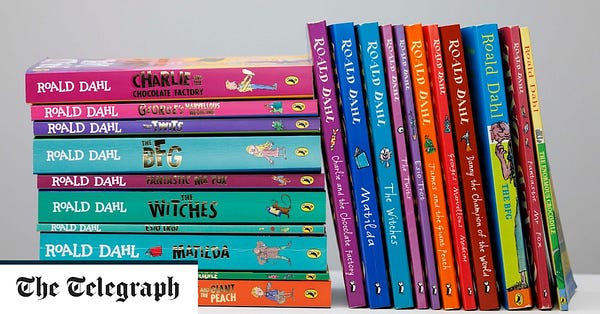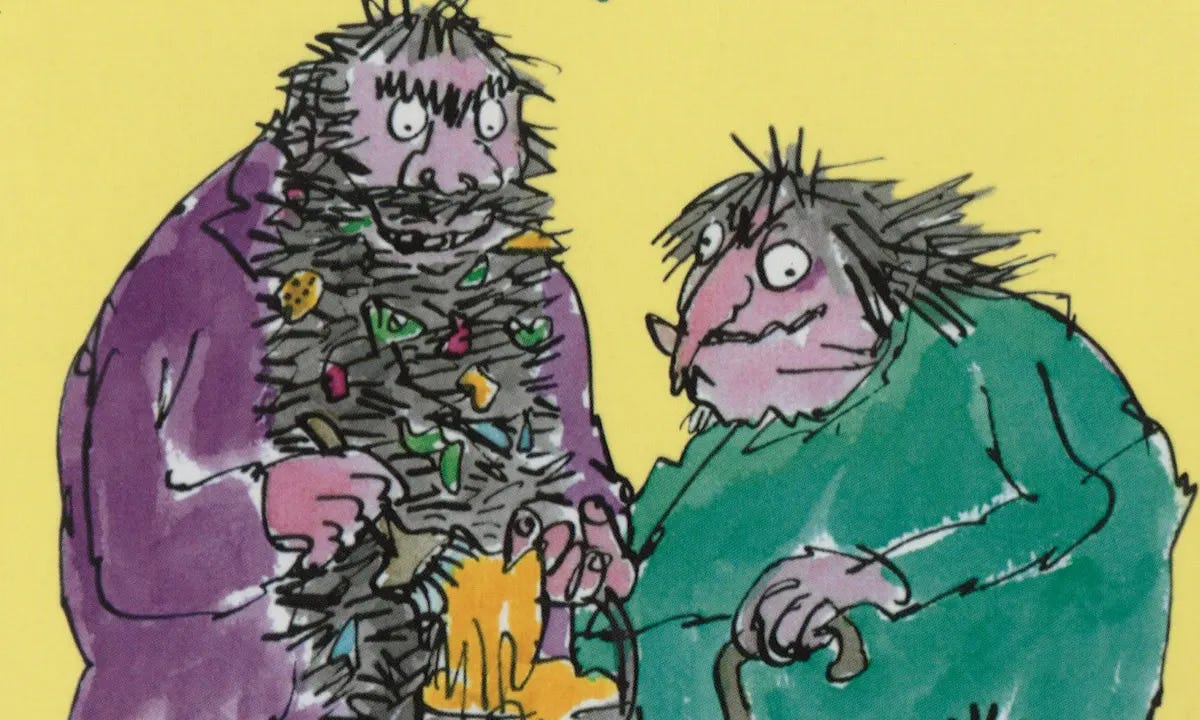“A person who has good thoughts cannot ever be ugly. You can have a wonky nose and a crooked mouth and a double chin and stick-out teeth, but if you have good thoughts they will shine out of your face like sunbeams and you will always look lovely.”
-The Twits, Roald Dahl (my apologies for not editing out the word ‘ugly’)
Puffin Books, the publisher of Roald Dahl’s beloved children’s novels such as James and the Giant Peach and Charlie and the Chocolate Factory, is on to something. The company has figured out how to tap into both sides of the pop culture wars in order to sell as many copies of Dahl’s fiction as possible.
A debate has been raging over whether Dahl (who died in 1990) would support posthumous changes to his stories made by sensitivity readers. These experts have combed through the Welsh author’s many novels, from The Witches to The Twits, and removed references to whatever they found truly beyond the pale. Words like ‘fat’ have been trimmed; ‘ugly’ has been excised. Both the diminutive and the gargantuan can now rest easy knowing that they are now they as non-gendered descriptors have transformed Oompa-Loompas into little ‘people’ and Cloud-Men into cloud ‘people’. I’m practically ugly-crying in joy over these changes, and I’m sure children the world over are heaving great, big, fat sighs of relief.
Puffin—along with the author’s estate, the Roald Dahl Story Company, now a division of Netflix—have teamed up with Inclusive Minds to make the stories accessible to modern children with modern child sensibilities, or some such rubbish. Perhaps it is to prevent kids from being massive jerks to one another, as musician and songwriter Billy Bragg optimistically suggests; perhaps, however, it is just to make grownups feel better, since no amount of censorship has ever changed human nature, let alone the wild nature of children. Or—and this is where the betting money should land—it’s a callous business decision tapping into the current cultural zeitgeist. Don’t hate the player, hate the game, right?


Whatever the rewriting of these often crude and hilarious tomes will achieve, it is most certainly “absurd censorship” as author Salman Rushdie so eloquently tweeted:


Outrage and backlash has been overwhelming and bipartisan, despite some efforts to cast this as a woke thing (for or against, for better or worse, woke is now the table salt of modern discourse). On the left and on the right, people largely agree that this is silly (at best) or a crime against art and literature and freedom of speech (at worst). Many have bristled at the changes because they seem so patently ludicrous, and because—of course—Dahl is not around to approve or condemn. Sure, he made changes to his own books when he was alive, removing some ghastly stuff like the Oompa Loompa’s original form as African pygmies. But there’s a wide gulf between making changes when you’re alive, working with your publisher and editors, and making changes when you’ve already snuffed it.
Nor should it matter that Dahl was a bit vile in his own eccentric way. Many of the best artists and writers and musicians are, after all. An admitted antisemite and all-around crude sort of man, it seems some people involved with his work—his estate, or Netflix, or Puffin, or the sensitive minds of sensitivity readers—would prefer history were scrubbed just enough that we forget those rougher edges altogether.
But Puffin is actually quite a lot cleverer than you might think. Sales of Dahl’s current books—untarnished by edits from the very sort of scolds Dahl gleefully skewered when he was alive—are way up. The 16-book set on Amazon has become a best-seller. When this story first broke, sets were selling for circa $33 on the online retailer. Good luck finding one for less than $50 now (but please, if you’re angry with Puffin over this nonsense, buy the books used!)
So here’s the scam—er, marketing genius:
Step 1. Commission controversial rewrites of beloved—but dated—children’s books. This leads to backlash and lots of people and the media complaining loudly at what an awful thing this is. People rush to buy up older versions of the book.
Step 2. Reverse course. As announced today, Puffin is walking back the rewrites to some degree and has announced that a new ‘Classic Collection’ of the novels will also be published.
Step 3. Profit.
The Classic Collection will “sit alongside the newly released Puffin Roald Dahl books for young readers” whereas the new, less offensive versions “are designed for children who may be navigating written content independently for the first time” the publisher reassures us.
Supporters of these changes—who can best be described as reactionaries reacting to the reactionary reactions of other reactionaries—will buy up the altered versions, as will plenty of people who have no idea what’s been going on and are blissfully unaware of the controversy. Critics of the changes, collectors, and others will buy the Classic Collection which, I suspect, will be far more popular than the revised editions. (A spot-on analogy I read earlier is how this is all very similar to Coke and New Coke and we all know how that turned out).
The point is, lots and lots of copies will be sold. Puffin will laugh all the way to the bank while curmudgeonly critics like your humble narrator shake their fist indignantly. Consumers will have choice—the greatest of all modern commodities!—and the easily offended will find succor; the outraged-over-the-easily-offended will be able to take refuge in the warm embrace of a small victory.
Children, of course, will continue to be cruel and terrible to one another regardless of which version they read, though most will likely not read either, nor will they watch the adaptations Netflix churns out, or will do so only half-heartedly while sitting on their phones watching TikToks about the adaptations and sink further and further into their screen-malaise, a generation raised not on offensive books or skinned knees but on an endless parade of vapid, half-baked content churned out by vapid half-baked content creators all without reprieve, consuming and consuming and consuming. Amen.
Send us off, Oompa Loompas:
“Is she the only one at fault? For though she’s spoiled, and dreadfully so, A girl can’t spoil herself, you know. Who spoiled her, then? Ah, who indeed? Who pandered to her every need? Who turned her into such a brat? Who are the culprits? Who did that? Alas! You needn’t look so far To find out who these sinners are. They are (and this is very sad) Her loving parents, MUM and DAD. And that is why we’re glad they fell, Into the garbage chute as well.”
Here’s one of my videos on this topic:
P.S. Many supporters of this move—or critics of the critics of this move, which make up their own constituency—have argued that since Dahl changed his books when he was alive, that he’d be fine with these changes now. I have argued that we cannot possibly prove such a claim, and so it is more prudent to err on the side of caution, and assume that Dahl (or any creator of art or literature or music etc.) would prefer that his works were left alone or he would have changed them before he shuffled off this mortal coil.
However, now we have proof of the author’s position. As I discuss in this video, Dahl was recorded discussing this very issue with artist Francis Bacon who shared his views on posthumous changes to their work. The conversation took place at Dahl’s home in Buckinghamshire in 1982. Via The Guardian:
“I’ve warned my publishers that if they later on so much as change a single comma in one of my books, they will never see another word from me. Never! Ever!” he said.
With his typically evocative language, he added: “When I am gone, if that happens, then I’ll wish mighty Thor knocks very hard on their heads with his Mjolnir. Or I will send along the ‘enormous crocodile’ to gobble them up.”
He was referring to his Norwegian roots and to his earlier story of “the greediest croc” in talking to Bacon, who apparently felt just as strongly about the subject, telling him: “There must be no changes to an artist’s original work when he is dead for any reason whatsoever.” Crossing himself in jest, Dahl replied: “I just hope to God that will never happen to any of my writings as I am lying comfortably in my Viking grave.”
It seems Dahl will be rolling in his Viking grave, instead.
P.P.S.
I find this description of beards in the opening pages of The Twits extremely offensive, as well as the implication that beards (not to mention being old) somehow add to the horridness of a man like Mr. Twit who would be perfectly horrid cleanshaven. We must chop this section out post-haste to preserve my feelings and what little self-regard I have left! Somebody send this to the fat, ugly sensitivity readers at once!
P.P.P.S. This is actually a very accurate explanation of beards, which—as a bearded person (or a cleanshaven-challenged person)—I am only too familiar with. Stowaway crumbs and ‘tasty morsels’ do indeed nest within the hairy face-jungle, for better or worse . . . .
A version of this post first appeared on my blog at Forbes.





